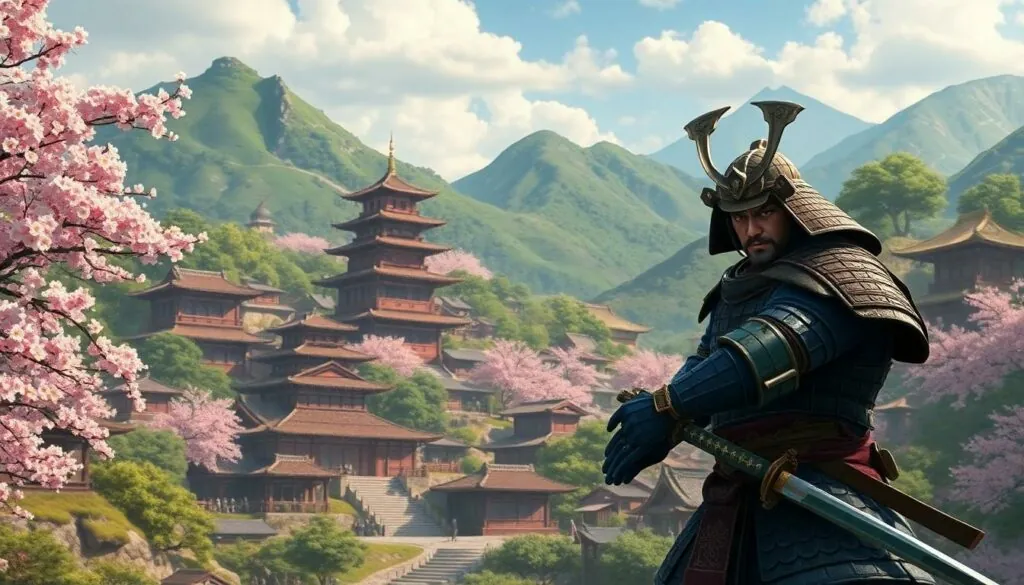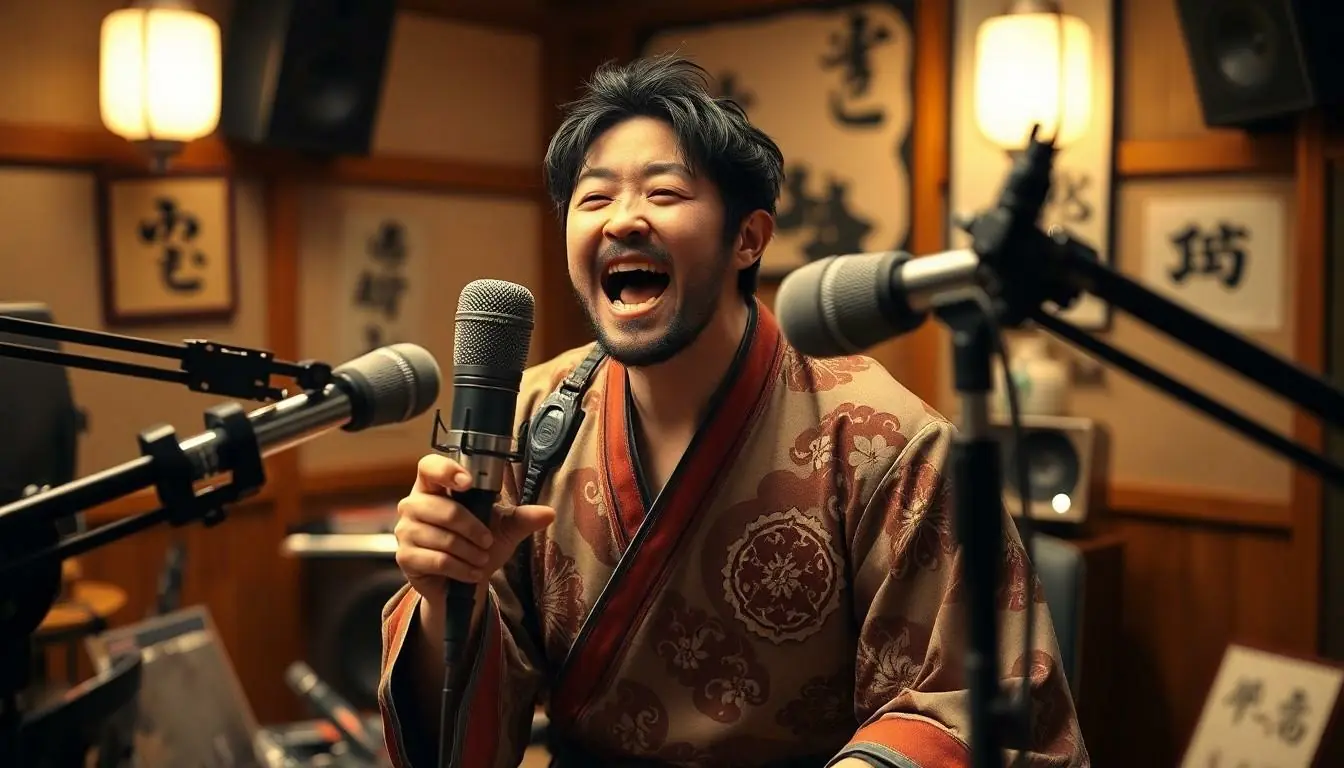Table of Contents
ToggleIn the world of video games, few titles have captured hearts like Ghost of Tsushima. With its stunning visuals and gripping storyline, it’s no wonder players are drawn into the rich tapestry of feudal Japan. But let’s not forget the unsung heroes behind the scenes—the Japanese voice actors who breathe life into the characters. They’re the ones who make Jin Sakai’s struggles feel like your own and turn every battle cry into a battle anthem.
Overview Of Ghost Of Tsushima
Ghost of Tsushima immerses players in the rich culture and breathtaking landscapes of feudal Japan. Set during the Mongol invasion of the 13th century, the game’s narrative follows Jin Sakai, a samurai who must navigate the conflict and protect his homeland. Engaging visuals and intricate character designs enhance the storytelling experience, making players feel part of this historical moment.
Japanese voice actors play a pivotal role in bringing the characters to life. Their performances add depth and authenticity, connecting players emotionally to Jin and his allies. Actors like Daisuke Tsuji, who voices Jin, deliver performances that reflect the character’s internal struggles and growth. Supporting characters voiced by talented actors further enrich the game, providing diverse perspectives on honor and sacrifice.
Combining stunning visuals with profound storytelling, Ghost of Tsushima showcases the importance of voice acting in video games. Voice actors’ dedication elevates emotional scenes and intensifies the overall impact of the gameplay experience. Many players report a heightened sense of immersion due to the authentic Japanese dialogue, which enhances the game’s cultural resonance.
Utilizing high-quality production and expert voice talent, the game received praise from critics and fans alike. The harmonious blend of music and voice acting underscores significant moments, enhancing emotional engagement. With its artistic achievements and compelling narrative, Ghost of Tsushima stands out as a landmark title in the gaming industry.
Significance Of Japanese Voice Acting
Japanese voice acting adds depth to the gaming experience in Ghost of Tsushima. Players connect more profoundly with characters through authentic cultural representation.
Cultural Authenticity
Cultural authenticity plays a vital role in narrative immersion. The Japanese language enhances the game’s realism, bringing feudal Japan to life. Daisuke Tsuji’s portrayal of Jin resonates with players, as it reflects genuine experiences and emotions. Local expressions and dialects enrich dialogue, making each interaction feel genuine. Voice actors embody their characters with precision, providing clarity and familiarity to cultural nuances. Through their performances, the game conveys historical context accurately to its audience. This dedication to authenticity strengthens the connection between players and the game world, promoting a deeper appreciation for Japanese culture.
Emotional Impact
Emotional impact stems from the powerful performances of Japanese voice actors. They effectively convey complex feelings, creating real emotional connections with players. Tsuji’s performance as Jin captures struggles between honor and sacrifice. Supporting characters add diverse viewpoints that heighten the emotional stakes throughout the storyline. Tension amplifies in significant moments, drawing players into the narrative’s intensity. As players hear the nuances in voice acting, they experience deeper empathy for the characters’ journeys. Engaging performances leave lasting impressions, elevating the overall gameplay experience in memorable ways.
Meet The Cast
Ghost of Tsushima features a talented cast of voice actors who bring authenticity to the game’s rich storytelling. Each performance significantly contributes to the emotional depth of the narrative.
Jin Sakai
Daisuke Tsuji voices Jin Sakai, the game’s central character. Tsuji’s performance captures Jin’s internal conflict and growth as he navigates the complexities of honor and duty during the Mongol invasion. He infuses Jin with vulnerability and determination, allowing players to connect deeply with his journey. Tsuji’s command of local expressions enhances the authenticity of the character, immersing players in feudal Japan. Emotional scenes resonate powerfully due to Tsuji’s nuanced delivery, reflecting themes of sacrifice and resilience.
Norio
The character Norio is voiced by Eric Steinberg, who effectively portrays a warrior monk. Steinberg brings Norio’s strength and dedication to life, emphasizing his commitment to protecting his village. His voice work provides insight into Norio’s values and struggles faced in wartime. The interactions between Norio and Jin highlight contrasting ideals of honor, enriching the overall narrative. Steinberg’s performance captures Norio’s unwavering loyalty and moral complexities, adding depth to the game’s exploration of friendship and sacrifice.
Lady Masako
The voice of Lady Masako is delivered by the talented Maureen Teefy. Her portrayal showcases Masako’s fierce determination and emotional turmoil as she seeks vengeance for her family. Teefy’s ability to convey strength and vulnerability creates a compelling character arc, allowing players to see both her warrior spirit and personal losses. Interactions with Jin reveal Masako’s steadfastness as well as her desire for justice. Teefy’s performance emphasizes the theme of honor, highlighting the sacrifices made by women in feudal Japan.
Other Notable Characters
Several notable characters round out the game’s cast, each with unique voices and perspectives. The roles of Takashi, voiced by Ryoichi Tsurumaki, and Yuna, brought to life by Naomi Yang, enhance the narrative with their diverse views on loyalty and courage. Tsurumaki’s deep voice reflects Takashi’s steadfastness, while Yang captures Yuna’s resourcefulness and bravery. Supporting characters like these offer players varied insights into the struggles faced by those affected by the Mongol invasion. Their performances, rooted in cultural authenticity, further immerse players in the game’s emotional landscape.
Behind The Scenes
The voice acting in Ghost of Tsushima immerses players in the game’s rich, cultural narrative. Japanese voice actors worked tirelessly to bring their characters to life through their performances.
Voice Acting Process
Actors participated in a unique recording process that included extensive preparation and collaboration. Voice actors rehearsed their lines while focusing on the emotional depth of their characters. Each session involved multiple takes to ensure that the performances accurately captured the intended feelings. Directors provided valuable feedback during recordings to guide the actors’ interpretations. This attention to detail resulted in authentic dialogue that resonated with players. The interplay between voice, tone, and cultural nuances allowed the game to maintain its realistic portrayal of feudal Japan.
Director’s Vision
The director’s vision played a crucial role in shaping voice performances throughout the development. They aimed to create a narrative that honored Japanese culture while engaging global audiences. Director Nate Fox emphasized the importance of genuine representation in storytelling. This dedication motivated actors to explore their characters more deeply. Emotionally charged scenes required careful direction to ensure that voice deliveries matched the intensity of the visuals. Communication between the director and the voice actors established a collaborative environment, fostering a sense of unity in the storytelling process.
Conclusion
The Japanese voice actors in Ghost of Tsushima play a pivotal role in crafting an unforgettable gaming experience. Their exceptional performances breathe life into the characters and elevate the emotional depth of the storyline. By authentically representing the culture and language of feudal Japan, these talented actors enhance players’ immersion and connection to the game’s narrative.
As players journey through the struggles of Jin Sakai and his allies, the powerful portrayals resonate on a personal level, making each moment feel impactful. Ghost of Tsushima not only showcases stunning visuals and engaging gameplay but also highlights the vital importance of voice acting in creating a rich and authentic gaming experience.







